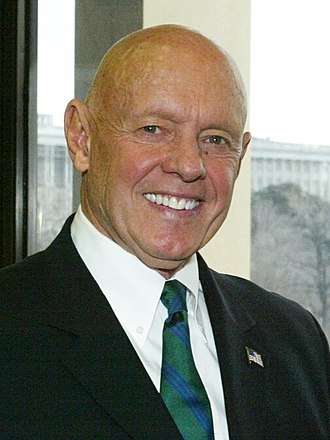Stephen Covey

Stephen Richards Covey (October 24, 1932 – July 16, 2012) was an American educator, author, businessman, and keynote speaker. His most popular book is The 7 Habits of Highly Effective People.[1] His other books include First Things First, Principle-Centered Leadership, The 7 Habits of Highly Effective Families, The 8th Habit, and The Leader In Me: How Schools and Parents Around the World Are Inspiring Greatness, One Child at a Time. In 1996, [Time magazine named him one of the 25 most influential people.[2] He was a professor at the Jon M. Huntsman School of Business at Utah State University at the time of his death.
Covey was born to Stephen Glenn Covey and Irene Louise Richards Covey in Salt Lake City, Utah, on October 24, 1932.[3] Louise was the daughter of Stephen L Richards, an apostle and counselor in the first presidency of The Church of Jesus Christ of Latter-day Saints under David O. McKay. Covey was the grandson of Stephen Mack Covey who founded the original Little America Wyoming near Granger, Wyoming. He was athletic as a youth but suffered from a slipped capital femoral epiphysis in junior high school, requiring him to change his focus to academics and a member of the debate team and graduated from high school early.[3]
Covey earned a Bachelor of Science degree in business administration from the University of Utah, an MBA from Harvard Business School at Harvard University, and a Doctor of Religious Education (DRE) from Brigham Young University. He was a member of Pi Kappa Alpha fraternity. He was awarded ten honorary doctorates.[4]
Covey was heavily influenced by Peter Drucker and Carl Rogers. Another key influence on his thinking was his study of American self-help books that he did for his doctoral dissertation.[5] A further influence on Covey was his affiliation with The Church of Jesus Christ of Latter-day Saints. According to Clayton Christensen, The Seven Habits was a secular distillation of Latter-day Saint values.[6]
The 7 Habits of Highly Effective People, Covey’s best-known book, has sold more than 30 million copies worldwide since its first publication in 1989. The audio version became the first non-fiction audio-book in U.S. publishing history to sell more than one million copies.[7] Covey argues against what he calls “The Personality Ethic”, something he sees as prevalent in many modern self-help books. He promotes what he labels “The Character Ethic”: aligning one’s values with so-called “universal and timeless” principles. Covey adamantly refuses to conflate principles and values; he sees principles as external natural laws, while values remain internal and subjective. Covey proclaims that values govern people’s behavior, but principles ultimately determine the consequences. Covey presents his teachings in a series of habits, manifesting as a progression from dependence via independence to interdependence.
Covey released The Leader in Me: How Schools and Parents Around the World Are Inspiring Greatness, One Child at a Time in November 2008. It tells how “some schools, parents and business leaders are preparing the next generation to meet the great challenges and opportunities of the 21st Century. It shows how an elementary school in Raleigh, North Carolina, decided to try incorporating The 7 Habits of Highly Effective People and other basic leadership skills into the curriculum in unique and creative ways. Inspired by the success of Principal Muriel Summers and the teachers and staff of A.B. Combs Elementary School in Raleigh, other schools and parents around the world have adopted the approach and have seen remarkable results”.[8]
